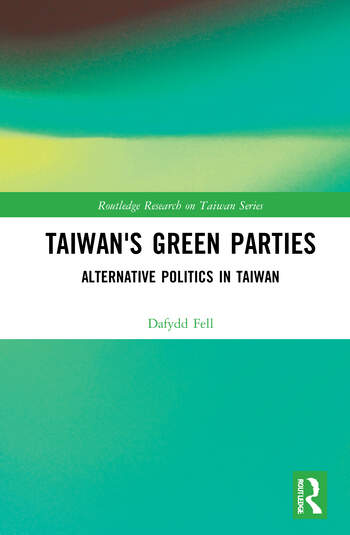
My review of Dafydd Fell’s book Taiwan’s Green Parties was published in the Asia Pacific Greens newsletter. Also of note, the Asia Pacific Greens have issued a statement which expresses strong support for Taiwan’s sovereignty. Read the full statement.
Taiwan’s Green Parties is a thorough history of Green Party Taiwan (GPT) since its formation in 1996. The plural form of parties in the title refers to the splinter party, Trees Party, that formed in 2014 and the Social Democratic Party which formed short-lived alliances with the Green Party in the 2016 elections. While these other parties also contribute to the fabric of progressive politics and social movements in Taiwan, the main focus of the book is on the GPT.
The GPT formed in 1996, the same year that Taiwan held its first presidential election. Some would consider this the date that Taiwan became a full democracy. Hence, the GPT can be considered to be one of the parties that has been a constant participant in Taiwan’s electoral democracy. This is significant because although Taiwan’s politics is dominated by two major parties there have been many third parties that have risen and fallen over time. Although the GPT may have had less electoral success than some other third parties, it has still had an important place in Taiwan’s political landscape.
The book focuses on three key areas: electoral performance, media visibility and international engagement. It is perhaps the latter where the GPT have been most successful. Fell writes of the visit of Penny Kemp of the Green Party of Wales and England to Taiwan in 1996 soon after the party was formed. This was during the Taiwan Strait Missile Crisis and the visit represented a strong show of support for Taiwan’s democracy at the time.
Bob Brown visited Taiwan in May 1996 which led to the development of an Asia-Pacific Greens network. There have been ongoing ties between the Australian Greens and the GPT. Taiwan hosted the Asia-Pacific Greens Congress in 2010 with Bob Brown in attendance.
Although the GPT has had limited electoral success it has been at the forefront of activism for numerous causes. The prominence of various issues in the party’s campaigns have often reflected the key issues of social movements in Taiwan. In its early days the party was focused on anti-nuclear and environmental issues. Since 2010 the party has nominated a number of LGBT candidates. These candidates have played a prominent role in the GPT’s campaigns and LGBT issues have become a policy priority for the GPT. Taiwan eventually legislated for same-sex marriage in 2019. What was once a marginal issue had become accepted by the mainstream.
GPT have been innovative in campaigning. In some ways this may be a response to a lack of resources, but it also in part reflects their values. GPT were the first party to campaign by riding bicycles. Although other parties later followed this trend, for the GPT it reflected that their members already rode bicycles regularly, not just for the purpose of political campaigning. The GPT was also innovative in the use of social media. This enabled them to reach a large audience without having to spend large amounts of money.
The book delves into the details of the party’s electoral campaigns and in doing so reveals the strengths and weaknesses of the party. Lack of continuity in candidates has been a problem with most candidates only contesting one election. Electoral wins are more likely if candidates build support and name recognition over multiple elections.
Another important point is balancing the tension between staying true to the party’s values while being able to gain enough votes to win elections. The GPT has often opted for ideological purity over political pragmatism which has placed a limit on its ability to win votes. It has on occasion foregone chances to cooperate with or support the Democratic Progressive Party (DPP) in order to remain true to the ideals of its members. Fell notes that one of the more successful third parties in recent years, the New Power Party, has been able to successfully balance its relationship with the DPP. The GPT needs to be able to find that balance point.
Fell’s study is comprehensive and contains many details of the relatively short history of Green politics in Taiwan. He ends with recommendations for the future of the GPT. Some of the recommendations are quite general and could apply to any political party. For example, expanding the membership base and building a sound financial base with regular donations. Although the GPT has not had the level of electoral success that it aspires to, it is notable for its persistence as other third parties in Taiwan have tended to fade away as their success has been dependent on personalities or their ideologies have lost electoral support. Whether or not the GPT experiences electoral success in the near future, they will still be an important force in promoting critical environmental and social issues in Taiwan.
